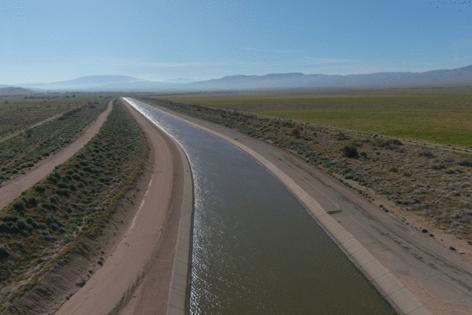Biden's new California water rules spark broad backlash, as possible court battle looms
Published in Political News
Last week, the Biden administration approved its overarching plan for how to run California’s systems of pumps, canals and reservoirs that serves millions of people and much of the state’s farmland.
The Bureau of Reclamation’s decision Friday ended a four-year effort to overturn the Trump administration’s previous 2019 rules for the Central Valley Project, which environmentalists and the state of California claimed did not adequately protect endangered fish.
But neither environmentalists nor agricultural powerhouses are happy with Biden’s new plan. After Trump vowed on the campaign trail to send more water to farmers and less to fish, it’s likely this plan is headed for a court battle.
Gov. Gavin Newsom framed the new rules as a measure to make the aging State Water Project and Central Valley Project more resilient to the extremes of climate change.
“We know what the future has in store for our state: hotter hots and drier dries,” he said in a statement last week. “That means we have to do everything we can now to prepare and ensure our water infrastructure can handle these extremes.”
Deliveries vs. environmental protections
Called biological opinions, the rules regulate how state and federal water systems operate to balance water deliveries with protections for endangered fish species. A frequent source of political tension, this pits agriculture and urban water users against environmental conservation.
The new biological opinions, effective immediately, replace the rules enacted by the first Trump administration. Those passed in 2019 drew harsh criticism from environmentalists and state officials alike, who warned it would harm salmon and other Delta fish.
Biden’s rules are expected to increase water deliveries for major urban water suppliers and many farms, but will cut supplies for some farmers and is expected to reduce habitat for native fish species drawing closer to extinction.
Environmental groups, however, argue that the rules introduced by the Biden and Newsom administrations are even more damaging, offering weaker protections for the state’s iconic Chinook salmon, the endangered Delta smelt and other species.
A federal environmental review last month found that the new operating plan would further imperil salmon populations already in critical decline, predicting a significant drop in the number of young salmon.
The plan, long a political flashpoint, is likely bound for the courts and potentially another rewrite.
Potential court battle
Trump vowed on the campaign trail to send more water to conservative-leaning Central Valley farmers, saying he would turn on a giant “faucet” and promised Californians “more water than you ever saw and the smelt is not making it anyway. … All those fields that are right now barren, the farmers would have all the water they needed.”
A November analysis by the Bureau of Reclamation found that the new rules will negatively impact several protected and struggling fish species such as Chinook salmon and Delta smelt.
According to some estimates, about 5.5 million salmon once returned to California rivers in the 19th century. In the last five years, fewer than 200,000 of the fish on average were counted by state and federal fisheries.
While more cold water will be stored in Lake Shasta and released during the summer and fall to support salmon spawning, the plan falls short in supporting fish through later life stages and will ultimately reduce the number of juveniles, according to the report.
In critically dry years, winter-run Chinook salmon could see a 23% decrease in juvenile production compared to baseline conditions, which are already pushing the species toward extinction.
Even in wet years, the modeling predicts a decline in the number of juvenile winter-run salmon.
The new federal rules are “not the Christmas present we asked for and certainly not the lifeline already struggling salmon fishing families needed,” said Scott Artis, executive director of Golden State Salmon Association.
“The Bureau of Reclamation threw some coal in their stockings in the form of water policies that have been an environmental disaster that’s also impacted Tribal and Delta communities,” Artis said in a statement.
Many agricultural organizations and urban water agencies praised the new approach, describing it as a balanced option. Others, including the powerful Westlands Water District, expressed disappointment with the rules that will cut their water deliveries in the coming years.
“The selected operations regime will reduce surface water supply reliability for the communities, farms, and ecosystems reliant on water by nearly 100,000 acre-feet annually,” said Federico Barajas, director of the San Luis & Delta-Mendota Water Authority, in written comments.
The new rules are only one step that is part of another more overarching state regulation called the Bay-Delta Water Quality Control Plan. Sometime this coming year, the state water board will vote to either require more water to flow through the beleaguered estuary or permit water users to voluntarily restore habitat for fish.
_____
©2024 The Sacramento Bee. Visit sacbee.com. Distributed by Tribune Content Agency, LLC.




























































Comments